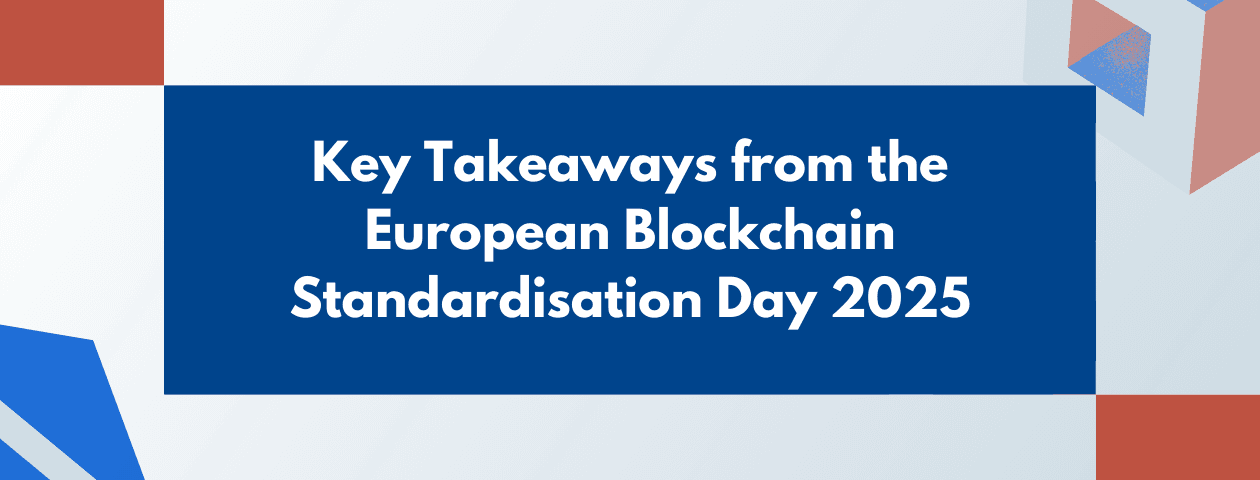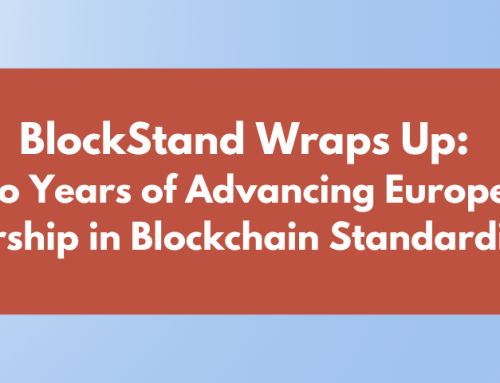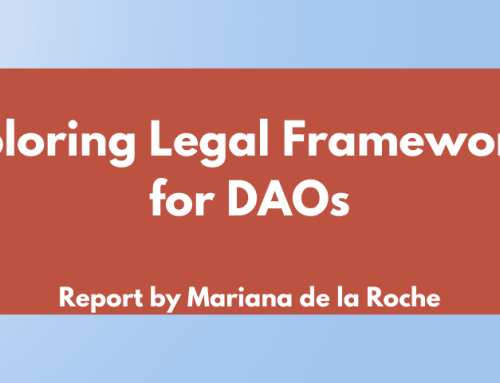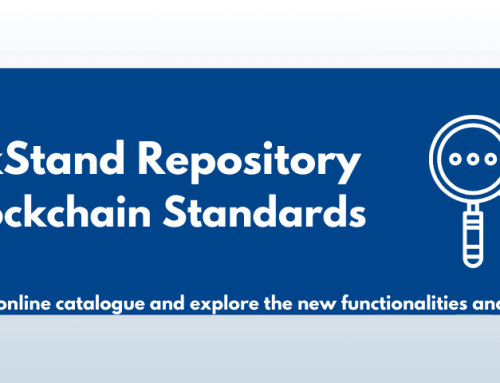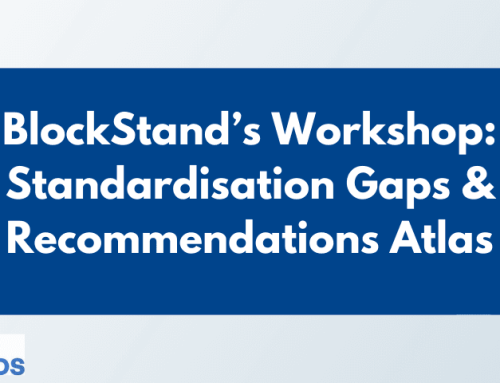In April 2025, together with SEEBLOCKS.eu we hosted the European Blockchain Standardisation Day in Brussels, a key event bringing together industry experts, EU representatives, and blockchain leaders to discuss the future of blockchain technology in Europe. The event welcomed representatives from the European Commission, including Pierre Marro (DG CNECT), Emilio Dávila-González (DG CNECT), Joachim Schwerin (DG GROW), Jose Manuel Panizo Plaza (DG DIGIT), Yves Leboucher from CEN-CENELEC, and Chairman of ISO TC 307, Scott Farrell, among other professionals from the blockchain and DLT communities.
Throughout the day, it hosted 8 exciting panels, diving deep into topics ranging from digital wallets and regulatory frameworks to blockchain for ESG and the future of digital finance. In this post, we’re bringing you the key takeaways from each of those panels, showcasing the main insights and the direction Europe is heading in terms of blockchain standardisation.
Key Takeaways from the Panels
- Digital Wallets in DLT
We explored the importance of standards in building interoperable blockchain infrastructures that meet the needs of diverse stakeholders. The panel highlighted the ongoing challenges in blockchain adoption, particularly around privacy, security, and user experience, despite growing awareness. The role of decentralized digital identity was also discussed, with emphasis on GDPR compliance and the need for clearer use definitions. The EU’s opportunity to lead the way in shaping digital wallet standards was acknowledged, alongside a strong call for more youth involvement in blockchain standardisation.
- Application of the Digital Product Passport in Global Value Chains
The importance of building the Digital Product Passport (DPP) on decentralised technologies (DLT) was emphasized to ensure trust and transparency, avoiding the risks of centralised systems. Clear standards aligned with Web3 frameworks are necessary for success, with a focus on empowering consumers through accessible, open standards. The panel also highlighted the need to break down data silos in supply chains, promote fair competition for SMEs, and ensure that DPP technologies prioritize security, decentralisation, and scalability.
- Digital Finance: Cryptos & Digital Assets
The panel stressed the need for a blend of law and tech expertise in standards development, with lawyers playing a crucial role in operationalizing legal frameworks for tech. Key challenges include finding ways to drive capital into innovation, balancing regulation and risk, and ensuring the EU continues to invest in infrastructure to support Web 3.0. While the EU is making strides in areas like EBSI and MiCA, greater exposure of its infrastructure and regulatory frameworks is needed to foster innovation. User-focused convenience and stablecoin volatility were also highlighted as barriers to adoption.
- DLTs Supporting Key European Initiatives – Focus on EBSI
The panel highlighted EBSI as a key enabler of trusted digital services, supported by verifiable credentials, trust models, and decentralised identifiers. Although not tied to a specific regulatory framework, EBSI aligns closely with policy initiatives like eIDAS and is seen as a public good. Standardisation, led by CEN and CENELEC, and ETSI, is central to EBSI’s development, with no friction noted with ISO TC 307. The focus on interoperability and international alignment underscores EBSI’s role in supporting digital identity frameworks across jurisdictions. Looking ahead, EBSI’s governance will transition to the new EDIC entity, reinforcing Europe’s push for technological sovereignty.
- Standardising ESG (Environmental, Social & Governance) Frameworks with Blockchain: Enabling Global Alignment and Accountability
The panel emphasized that standardisation must extend beyond code to include teams, organisations, and documentation practices. The risk of small businesses investing in blockchain systems that aren’t interoperable was also highlighted. A crucial thought of the discussion was that trust in decentralised systems doesn’t disappear—it shifts to the underlying infrastructure, which must be secure, transparent, and supported by active developer communities. There is also a pressing need to build data ecosystems that respect human rights and support digital autonomy, while addressing the lack of EU-wide recognition of blockchain as a trusted service. Educating builders and advancing documentation standards were seen as essential for scaling the ecosystem effectively.
- DLT Standards Supporting Privacy and Security
The panel provided a comprehensive look at current efforts in blockchain and DLT security and privacy standardisation. Work is progressing in ISO TC 307 and CEN JTC 19 to position DLT as a trust-certified service, complemented by certification frameworks like the ISO 27001 series. While CEN and CENELEC focuses on security and ISO TC 307 on privacy, both areas are critical to blockchain adoption—especially in a regulatory context like the EU’s, which demands strong data protection. Key challenges include the lack of AI-related standards, fragmented regulatory requirements, and the need to ensure blockchain standards remain platform-independent. Looking ahead, the focus must be on agile standardisation, identity protection, quantum resilience, and coordinated input from developers, cybersecurity experts, and open source communities to keep pace with fast-evolving threats and technologies.
- Future Blockchain Standardisation Activities & Actions
The last panel of the day emphasized that blockchain innovation is market-driven, not rooted in legislation, with strong momentum coming from real-world use cases rather than EU standardisation requests. Sustainability, smart contracts, and initiatives like the Data Act were highlighted as key areas needing clearer definitions and stronger alignment with standards. Looking ahead, inclusivity, gender balance, and SME participation were stressed, alongside the need for public infrastructure and agile, tech-neutral standards that align with EU policy.
Conclusion
The European Blockchain Standardisation Day made it clear that Europe is not only engaging with blockchain technology but actively shaping its future through thoughtful, inclusive, and agile standardisation efforts. From infrastructure and identity to sustainability and security, the discussions highlighted both the complexity and the immense potential of blockchain in supporting Europe’s digital sovereignty. Collaboration across sectors, disciplines, and borders, strongly promoted by BlockStand over its implementation, are key to making these ambitions a reality.
Don’t miss out on future updates and insights from us and make sure you follow us on LinkedIn for the latest news and discussions shaping the future of blockchain standardisation in Europe!

